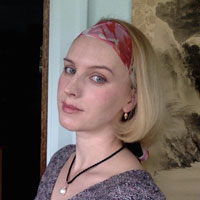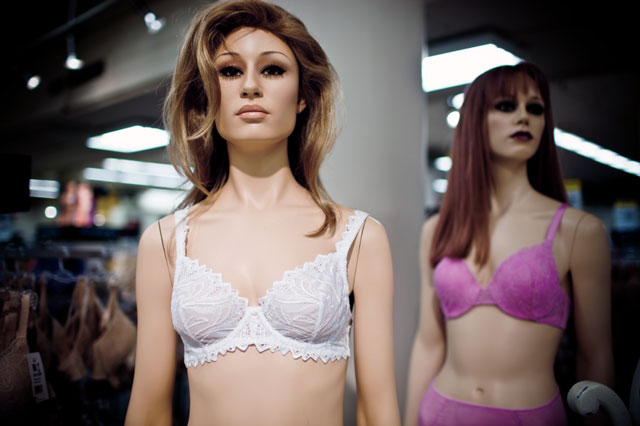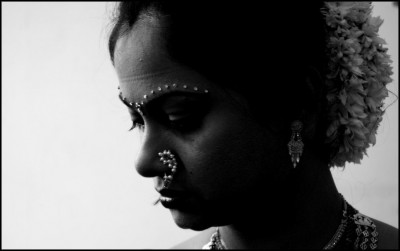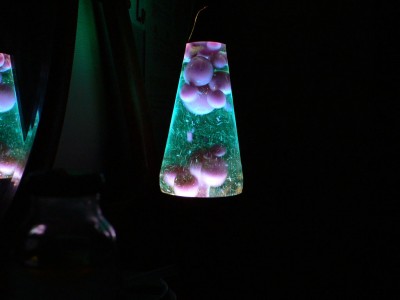Svetlana Beggs
ALINA
When I was young and living in San Francisco’s Sunset District with a roommate, I had a job selling underwear at Neiman Marcus. If I were to speak of this job with more reverence I would say that I sold “intimate apparel.” But “underwear” is more honest and also closer to “undercover,” because that’s what I was, an incognito undergraduate philosophy major, covered up by a lot of expensive underwear. I had to be a good salesperson to an occasional businessman who came in to grope La Perla panties (at $130 apiece). These men would ask, in a hushed, conspiratorial tone, “Where is the nearest restroom?” And I would say, “Straight and then left, next to the children’s department.”
One late night I was working alone and had to close the register. I was putting bras back on their hangers. When I looked up, I saw a very attractive woman who dared to examine underwear a few minutes before the store had to close.
She was a rare beauty, likely in her mid-40s, her body alert, her movements self-aware, like an actress or dancer. She was wearing simple dark slacks and a tan-colored, v-neck sweater and had the polished look of wealth that signals unattainable dignity. Her jet-black hair was long and wavy, her lips full, and her dark eyes calm. Her make-up was heavy, but tasteful. A wholesome beauty—it was as if she were created from a single cloth, showing no seams. She looked a bit like the Italian actress Monica Bellucci, who had had recently appeared in the movie The Matrix. To meet Monica on my night shift amidst underwear seemed itself akin to a trip into some kind of Matrix.
Monica had a question for me: “Do you have a burgundy La Perla bra in ‘34D’ and panties in ‘small’?” Her voice was deep, lacking in hesitation, or maybe it was the flatness of her heavy Russian accent, like a big book that falls on the floor, a blunt sound. At the time, my own Russian accent was strong, but as if full of apologies, not like a book on the floor at all.
I said, in our native tongue, “I speak Russian. I will check the size in our stockroom.”
For a moment she looked offended. I imagined she wanted to be left alone, among strangers who speak a foreign language, living their foreign lives. Another Russian, even a complete stranger, is always an invader. Chances were, a co-patriot could picture her life more or less accurately and, therefore, mercilessly. I hastily retreated into the stockroom and then emerged with “34D” and “small.”
Monica Bellucci was at the register, her wallet open and ready for the credit-card transaction. She eyed me quickly, then stretched out her manicured hand to say: “I’m Alina.” Then: “How old are you?”
I told her my name and that I was nineteen. Cold sweat was gathering on my forehead and I didn’t know why. I thought: Is she a bitch or a goddess? I wrapped her purchase in white tissue paper and was already putting it inside a small red shopping bag when I heard: “You have something about you.” When I looked up, I saw her assessing glance. It was a lazy assessment, costing her no effort at all, but I took it gladly. This “something,” I wondered, is it something she wants or something I want? Should I ask her to clarify? She clarified: “I’m here for a few days. I flew alone from Moscow, through New York. My husband is unfaithful to me—I ran away. Would you like to have dinner with me tonight? I will pay, of course.”
We walked together along Geary Street, the air suffocating us with summer exhaust fumes. Alina did not look around much and did not talk much either. She took me to Kuleto’s, a fancy place on Powell Street, between Geary and O’Farrell, “to start with drinks.” Lemon-drop martinis, that’s what she wanted. I was not yet twenty-one, I reminded her, so a Shirley Temple would do for me. It was not a cool move, but legal. We were shown to a small table not far from the window and I ordered Bloomsdale Spinach Salad and Filet Mignon. With a martini in hand, Alina seemed relaxed. I noticed that men nearby were looking in the direction of our table and pretending that they were not looking. Some of them were with women, maybe even their wives.
“Don’t look at them,” Alina dropped sharply.
I was defensive: “I’m not looking.” I felt stupid, not in control.
“Oh,” was all she let out and looked at me with those eyes, calm eyes, like a calculator. And I thought to myself: What am I doing here? Me, a member of the feminist philosophy group where my friend Jenny recently argued that to shave legs is to submit to the patriarchal framework. I recalled a line from a poem by Mayakovsky: here you are, a woman thickly powdered/looking like an oyster from the shell of your stuff. And so it seemed that Alina, with her captivating eyes, her delicate everything, wanted me to be a student of female-oyster science.
I decided to treat this dinner as a strict anthropological investigation of a species distinct from my tribe. But this powdered woman, who likely thought feminists to be unadorned man-haters, held my attention in a way that defied rational explanation. I felt physically sucked into her evening. Or was it a whole world-view? What else could have explained my sudden onset of embarrassment about my mostly make-up-free face? As if reading my thoughts, Alina reached into her bag, pulled out a lipstick and applied it to my lips, painting the territory rather expertly.
“Good shade for you,” she said. She also said that I reminded her a little of Monica Vitti, an Italian actress from the 60s film L’Avventura. Doing justice to the Italian-Monica clan held its undeniable attraction. The pull of patriarchal values, I said to myself. How low I’m sinking.
She asked about my life, and I told her the essentials: when I left Russia, why I majored in philosophy, and how I started working at Neiman Marcus. I tried not to reveal too much, and left out the part about my year-long leave of absence from college. I sensed how far away she was, listening, but from some other place, a tall tower, perhaps, like Rapunsel’s. She could be planning her seduction moves on unsuspecting men, I thought to myself. The waiter brought our salads and I started puncturing thick spinach leaves. Alina’s salad remained untouched. Does she count calories in salads? She seemed the type.
She got up to use the restroom and was gone for a very long time. Sitting all alone I thought how ridiculous I must appear: lonely, at this exclusive place, with that bright lipstick I never wear, spinach stabbed on my fork, the fork in mid-air. The waiting went on and on and I began to fear that Alina was gone for good. Would she return to pay the bill? I thought of the food we ordered, plus the drinks, plus the tip, and did a mental calculation: $150 at least. My maxed-out Visa could not cover it.
Outside the window a group of drunken young people was obstructing the sidewalk. Three young guys from the group stood apart howling like wolves, their girlfriends bent in half from hysterical laughter. Tourists walked around them trying not to notice. When I looked up, Alina was suddenly back. She sat down, picking up her drink with that manicured hand. Her soft, open presence lulled me into forgiveness and renewed submissiveness.
“I want to tell you something about men,” she said. “Any man can be tamed if he has the right woman next to him. You are at the right age to absorb this lesson. Most women are clueless and they waste their opportunities. Many women don’t even know how to walk like women or how to wear high heels by the time they reach the age of thirty! The body of a woman, every part of it, is like ammunition, but if you don’t know how to use it, it just hangs there, sad and limp.
“My dear girl,” Alina went on, “femininity is an art, a game, and a science. Men started wars for women, killed each other for women they desired. Those women knew what they were doing. Believe me, attraction is the glue that binds people. The real woman is aware of what she projects from every angle. She is her own choreographer. It is a feminine dance, you understand, and it goes on even when you are by yourself, even when you get up from your bed alone at night, or reach into your bag here in this restaurant. Surround yourself by many men and make them compete for you and then choose.”
She was rambling; the martini was doing its job. I was sure this bag of feminine-charm tricks was a mere quick glossary, and that the meatier lessons, or even a glimpse of chapter titles, would not be revealed that night. This was a disappointing realization.
There was a lot to say, but I said this: “To live this way, just to be desired by men?”
“No, to be desired generally, but mainly to feel connection with people, with many people at a deeper level. It is the only way to know a person, to feel the stuff he is made of. And to be generally desirable is the only way to get to know a lot of people intimately.”
“You mean having sex with many?”
“No, sex with a few and a deep connection with the rest.” She then said: “To be drawn into another person is bolshoe schastie.” A big happiness. The way she said it made me think of Bolshoi Ballet, the Big Ballet, happiness like a grand Russian institution, world famous for its success with the most Platonic of art forms.
“Can I ask you to do something for me?” she said with a tone hitting a different note, as if music had been changed abruptly from Tchaikovsky to a pop song by Spice Girls. “Could you stay with me tonight? I have a room at the Westin St. Francis, just up the street. Windsor Suite. Queen Elizabeth and Prince Philip stayed there some time ago. You will like the view—the city at your feet.”
I didn’t know what to say. What must be said in a situation like this?
“It is nothing improper,” she explained, sensing my shock. “I get scared at night and can’t sleep. I need to have someone nearby, someone I like.”
I was not sure how to proceed, so I asked about her husband, whether he is often unfaithful to her.
She looked straight at me, somewhat deflated, but willing to pay this price.
“Vadim, my third husband, is a businessman, an oil dealer, a very successful one. We met five years ago. He has been unfaithful from the beginning, but he will never leave me. Not that I want him to. He often brings home a girl or several girls, just for the night. Sometimes he comes home with his male friends and asks me to sleep with them, ‘to share’ me. I have been with many men my husband knows.”
I was listening, but her storyline was so indigestible I was having a hard time catching every word.
“Why do you stay with your husband?” I asked. The obligatory question.
“He is not a bad man. Some things are hard to explain. Vadim gives me freedom. And I don’t think he can do without me. I choose to stay. But I can’t sleep. Not alone in a big, foreign city. Stay with me tonight. What is one night in your long life?”
“OK,” I said hesitantly. I said it as if to myself and wondered whether I was now entering my experimental phase, since I was willing to go to hotel rooms with older women. I tried to picture my room at that moment: my bed still unmade, clothes scattered all over the floor and, in the kitchen, my roommate making tea and talking on the phone with her long-distance boyfriend in Boston.
I knew that if I returned to that room I would continue thinking about Alina, mulling over events of the evening, unable to sleep or read or call my friends. I was certain I couldn’t tell anyone about Alina, her hotel room or not. Sometimes it doesn’t matter what you do next because the important thing has already happened. Going to her hotel room was like that—it was that thing that happened next, after the important element.
“Why do you not have a man?” she asked. She said a “man” as opposed to a “boyfriend.” She meant: someone not a boy, a mature person, a masculine type. I was glad she thought me worthy of a “man.”
“I need to fall in love to be with a man.”
“Not always. Sometimes you can be kind. Or just reckless. Don’t be so hard on others.”
“And if you have no desire?”
“Then find it. Many people are desirable and not only those who desire you.”
She paid the bill and we walked into the cool air. The Westin St. Francis was only a block away. Not talking. Each with our own thoughts, listening to the city’s silence, a muffled sound, like a noise suppressed by force. The elevator took us to the thirty-first floor, to the Windsor Suite. I entered an extraordinarily large space with big windows and tasteful furniture in dark wood with light blue upholstery. I saw tidiness, the absence of a presence, as if all of it had been purchased and assembled earlier that day. Alina asked me to feel at home and then retreated into the bathroom for “a quick shower.”
When she returned her hair was up in a bun and she was wearing a long, light blue silk robe. As she walked, the material of her robe ran after her in a spiral motion. Her steps were small and bird-like. How modest she is, it hit me then. It was a modesty that left me free with my own ideas about her. She didn’t ask me to think of her in a certain way. She didn’t mind my judgments. I’m not modest, I realized, even when I didn’t wear make-up, even when I walked down the street in my boyish jeans thinking about philosophy, not looking at anyone, minding my own business. Even then I wanted people to see me in a certain light: a smart girl, a feminist, a girl going somewhere. Let them see me for only a fleeting moment, but I wanted their description of me to match my own.
It was my turn to take a shower in Alina’s luxurious, white bathroom where Prince Phillip did his intimate ablutions. My shampoo had a sweet coconut smell. When I was done Alina came in with a long silk robe in light pink.
“I bought this robe in Tokyo,” she said, “the softest silk you can find anywhere. It will suit you. Keep it. Think of me when you wear it.”
When I put it on and turned to look at the back in the mirror I saw the delicate image of a peacock, green feathers drawn in quick lines. The touch of luxury—for, at the time, this robe was the most luxurious piece of clothing my body had ever known—was intoxicating, like a physical surge of self-respect.
We were together on her bed, me in my peacock robe, Alina in hers. I recall sliding under the sheets as if trying not to touch the material. Who was in this bed last night? Another Russian woman? Did Alina find one in every city she visited? Alina’s perfume and arms enveloped me and she gently caressed my hair. Everybody has a presence when they are in bed, even when alone, I thought lying there, and that presence is like a confession, a slippage of the mind’s material through the material of the body.
Alina’s bed presence was surprisingly innocent and giving. She was lying still and holding me and that was it, but I felt—I could find no other way to put it—that she gave away her body generously. Gave freely to anyone. I thought her initially a Dostoevskian Nastasja Filipovna from my favorite novel, The Idiot. (I liked to mentally catalogue Russians I met into Dostoevskian types.) Nastasja, the tragic femme fatale, who threw one hundred thousand rubles into the fireplace during a birthday party, and then asked a specific person to fetch it from the fire with bare hands so that the guests could see his soul in action. No, the woman lying next to me was not Nastasja. She was Lizaveta from Crime and Punishment. Not the whole Lizaveta, but Lizaveta as far as Alina’s “soul in action” was concerned. Lizaveta, the meek, hard-working, younger sister of the pawn-broker and Raskolnikov’s accidental victim.
It had always puzzled me that many men lusted after Lizaveta, in spite of her unremarkable looks, her meekness, and poverty. She must not have smelled very nice either. But Lizaveta gave herself away readily to any man who wanted her, and she was often wanted, and admired, loved, needed. I hadn’t understood Lizaveta then, but nested in Alina’s arms, it suddenly dawned on me that Alina was Lizaveta, a person living in her body with generosity towards other bodies. This generosity was both innocent and knowing, non-judgmental and intuiting the terms and terminology of other bodies. She hugged me tighter. Was this the “chaste embrace” I had heard about? How did this come to her? To others like her? Did I ever have it? Would I ever?
“Those men, your husband’s friends who come to you, what are they like?” I asked.
“They are good people, darling, mostly gentle. It is just desire for them. It lives for only a little while.”
I wanted to believe these men were mostly gentle. Or gentle next to her. It seemed entirely plausible somehow.
“Were any of them in love with you? How could they not be?”
She was silent. I sensed her sadness and blankness, but it was very abstract, as if there was no door into that space, not for me.
“At Neiman Marcus you said to me ‘you have something.’ What did you mean?”
“The way you looked at me—with the defiance and boredom of a young girl.”
I closed my eyes and fell into a deep cave of sleep. I had a vivid dream. I was in a movie theater watching a film made with technology that awakens all of our senses. On the screen I watched and felt the most primitive one-celled organisms bumping into each other in endless waves of orgasms. I was watching this film and thinking: Life evolved from orgasms.
I woke up to soft sunlight and Alina sitting on our bed, dressed in jeans and a white linen blouse. Her face was radiant and a little shiny from face cream. She was nursing a cup of coffee in a black mug. We ordered room service breakfast—scrambled eggs and French toast with jam—and asked polite questions about quality of sleep and quality of weather. My shift at work started at 9:00 a.m. sharp. I could see Neiman Marcus from a window in the living room, right across Union Square. A very short walk back to my life.
I didn’t want to return to work in clothes I wore the night before, so Alina found a dress for me. I put my hands up, obediently, like a girl, while she slipped the dress over my head. It was slightly big on me—I was slimmer than Alina—but it worked. A handsome, light blue dress: simply cut, heavy linen, knee-length. We found a wide light belt to go with it—the dress looked more my size when I was belted at the waist.
She pulled out her big make-up case and got to work on my face. It took a long time and she followed a strict procedure: concealer, foundation, eye-shadow, little angled brushes, big brushes, a brush for every stroke and color. I was to look down when she applied mascara. I briefly glanced at myself in the mirror just for basic information and decided to really look later. That make-up session was Alina’s drawing of me on my face and I wanted to know how she saw me.
She disappeared into the bedroom and came back with a sizable Louis Vuitton bag and some clothes over her arm. Three dresses, a polka-dot top, two light-weight sweaters, my pink robe with the peacock. She packed the bag, my bag now, with my gifts and I thought: Is she preparing me for an escape, or perhaps an elopement?
Old bag across my chest, Louis Vuitton in hand, I was ready to depart. Alina walked me to the door and we did the Russian-style, double-cheek kiss. She said, “How lovely you look. Don’t be late for work.” These words sounded domestic, what the wife says to the husband on TV.
I marched across Union Square, past the front door of Neiman Marcus to the “employees only” entrance. I then turned around and started walking in the opposite direction, to Kuleto’s. Not seeing much, I just walked, fast and uncharacteristically purposeful. It was too early for Kuleto’s to be open, so I stood at the window looking at the table where I had sat the night before with Alina. Our chairs were turned legs up, perched on the table. It took me a moment to recognize myself in the window’s reflection behind Alina’s clever, cat-eye make-up that would be washed away tonight. I felt certain that I would never see her again, would never feel her gentle presence, would not know how to be gentle myself.
 Svetlana Beggs is a native of St. Petersburg, Russia, and holds an M.A. in Philosophy. Her poems will appear in forthcoming issues of Columbia Poetry Review and Pleiades, and her flash story was in a recent issue of Bartleby Snopes. Her philosophy essay about friendship and conflict was selected for a collection of essays, Friends and Foes. She lives in Seattle with her husband and daughter.
Svetlana Beggs is a native of St. Petersburg, Russia, and holds an M.A. in Philosophy. Her poems will appear in forthcoming issues of Columbia Poetry Review and Pleiades, and her flash story was in a recent issue of Bartleby Snopes. Her philosophy essay about friendship and conflict was selected for a collection of essays, Friends and Foes. She lives in Seattle with her husband and daughter.
Read more from Cleaver Magazine’s Issue #10.




